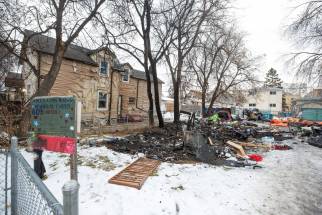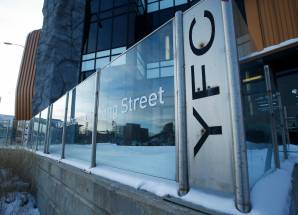Homeless camp destroyed by fire Second blaze at site in under two weeks
Read this article for free:
or
Already have an account? Log in here »
To continue reading, please subscribe:
Monthly Digital Subscription
$0 for the first 4 weeks*
- Enjoy unlimited reading on winnipegfreepress.com
- Read the E-Edition, our digital replica newspaper
- Access News Break, our award-winning app
- Play interactive puzzles
*No charge for 4 weeks then price increases to the regular rate of $19.00 plus GST every four weeks. Offer available to new and qualified returning subscribers only. Cancel any time.
Monthly Digital Subscription
$4.75/week*
- Enjoy unlimited reading on winnipegfreepress.com
- Read the E-Edition, our digital replica newspaper
- Access News Break, our award-winning app
- Play interactive puzzles
*Billed as $19 plus GST every four weeks. Cancel any time.
To continue reading, please subscribe:
Add Free Press access to your Brandon Sun subscription for only an additional
$1 for the first 4 weeks*
*Your next subscription payment will increase by $1.00 and you will be charged $16.99 plus GST for four weeks. After four weeks, your payment will increase to $23.99 plus GST every four weeks.
Read unlimited articles for free today:
or
Already have an account? Log in here »
Hey there, time traveller!
This article was published 28/11/2022 (1108 days ago), so information in it may no longer be current.
John Chen has lived above the Chinese restaurant he owns on the corner of Sargent Avenue and Langside Street for 21 years. When a homeless encampment formed in the community garden behind it five months ago, his relationship with its residents varied.
He called 311 regularly asking the City of Winnipeg to dismantle the encampment, yet brought the people living there free meals from his business.
On Sunday evening, when a large fire broke out at the encampment as Chen was taking dinner orders, he rushed to call 911.
“I didn’t want to see anybody hurt, so I called right away,” he said Monday morning, outside of the burnt remains of the encampment.
A fire broke out just past 6 p.m. at the Ashley Lynn Hudson Memorial Garden (609 Langside St.), caused by “numerous small explosions” from gas cylinders or propane tanks on the property, the city said.
No one at the encampment or surrounding homes was injured. One home was affected by minor smoke damage. The encampment is considered a total loss.
MIKE DEAL / WINNIPEG FREE PRESS The remains of a fire in a temporary encampment in a community garden on Langside Street between Sargent and Cumberland avenues.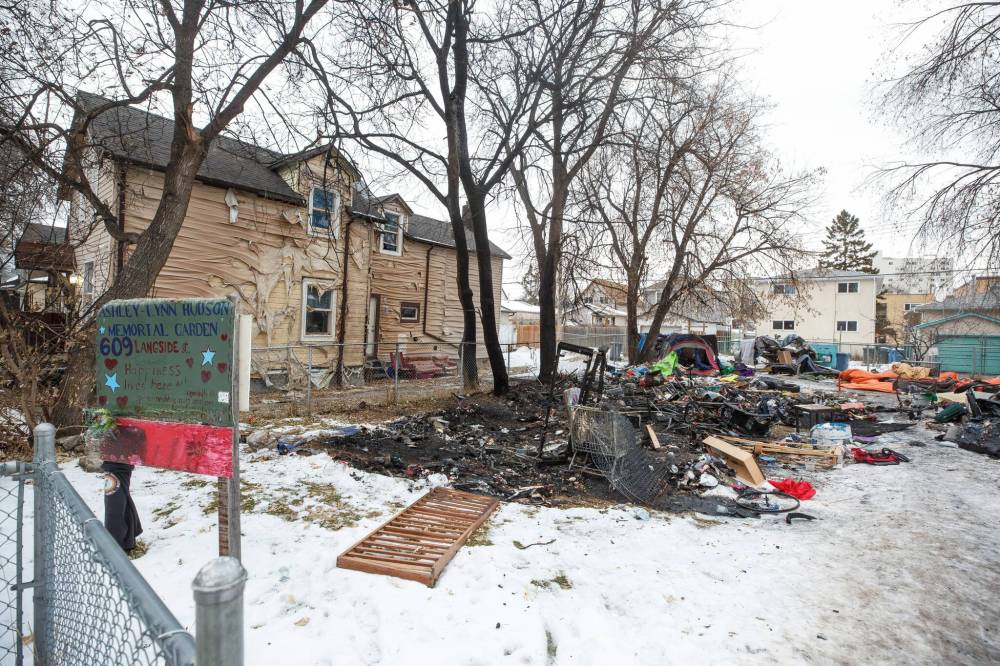
It’s an abrupt end to what Chen said was a strained relationship between homeowners in the neighbourhood and those in the encampment.
He and other community members had begged the city to dismantle the camp, citing increased thefts and safety hazards. One local business owner collected signatures and sent them to the city to stress how urgent it was for it to intervene, Chen said, but no action was taken.
A fire at the same encampment on Nov. 15 resulted in two people being displaced.
In the wake of Sunday’s fire, finding safe shelter for the 10 or so people who had been staying at the encampment was a challenge, according to Coun. John Orlikow, head of council’s community services committee.
Shelters at capacity, a lack of low-barrier options (places that don’t require sobriety, strict curfews and other restrictions), and some encampment residents having been banned from other shelters meant support workers struggled to meet needs after the fire, Orlikow said.
The councillor said he had not yet been updated on where the displaced residents ended up.
Orlikow said the city was “picking up more than slack” to support its homeless population, but it was the province’s responsibility to step up and to address a “glaring hole” in supports.
“I’m very concerned (about) the fact that we don’t really have a lot of options… to where we can take these people, at least on temporary basis, so they have some places stay warm and get some services,” he said.
“I’m very concerned (about) the fact that we don’t really have a lot of options… to where we can take these people, at least on temporary basis, so they have some places stay warm and get some services.”–Coun. John Orlikow
While shelter capacities and barriers can often be hurdles, End Homelessness Winnipeg president Jason Whitford said he often sees situations where people find encampments to be safer and a more communal option.
“People choose to be in encampments for reasons such as maybe they don’t want to go to the shelters, maybe they had a bad experience, perhaps they could have been barred from from maybe one or two of them, and they might live with addictions or mental health issues,” Whitford said Monday.
“People in encampments, from my observation, they’re becoming more resilient. There’s also some positive aspects to encampment where they protect and care for one another, and they and they feel safer in those environments than they wouldn’t in a congregated setting.”
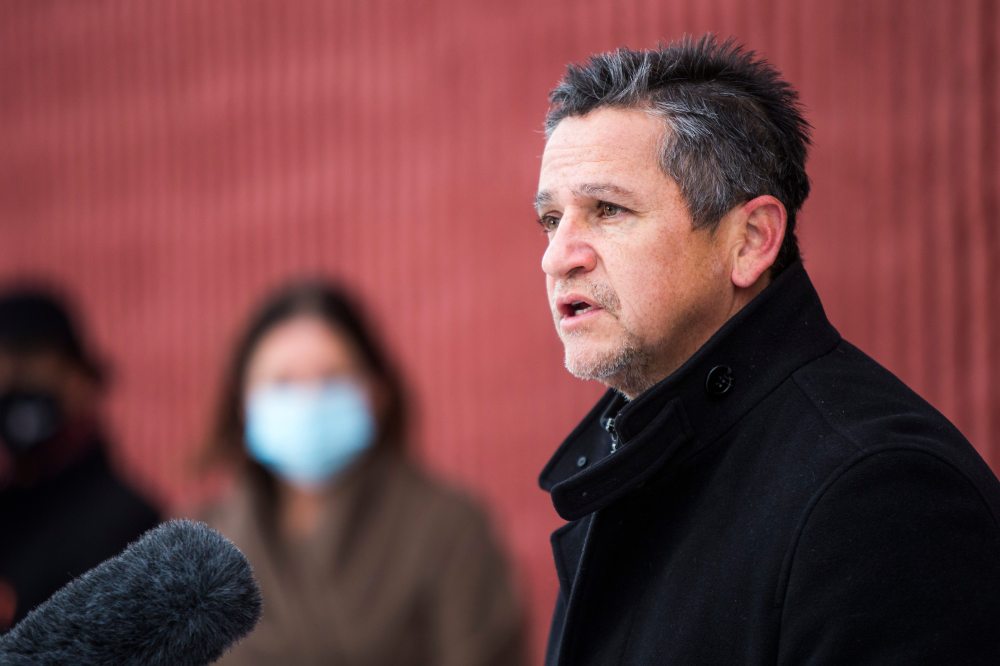
The decision to dismantle an encampment by the city is not made lightly, Whitford said. It’s considered an “extreme,” last-resort solution that can go against what he called Winnipeg’s “rights-based” approach to homelessness.
The decision is made based on the level of threat to the residents themselves or others in the community, and if the encampment is on private or public property.
“We want to exhaust all avenues to ensure willingness, but if it becomes a safety issue, then then there is no alternative… I’ve seen situations where it has been forced removal, but trying to encourage and offer support and resources, I think is, is the best approach,” Whitford said.
As encampments remain at high risk of fires (exacerbated as the weather gets colder), the Winnipeg Fire Paramedic Service has created a position within its ranks solely devoted to visiting encampments, along with non-profit staff and police, to work on fire prevention. The position, currently filled by a former fire inspection officer, has been in place for around 18 months.
MIKE DEAL / WINNIPEG FREE PRESS No one at the encampment or surrounding homes was injured. One home was affected by minor smoke damage. The encampment is considered a total loss.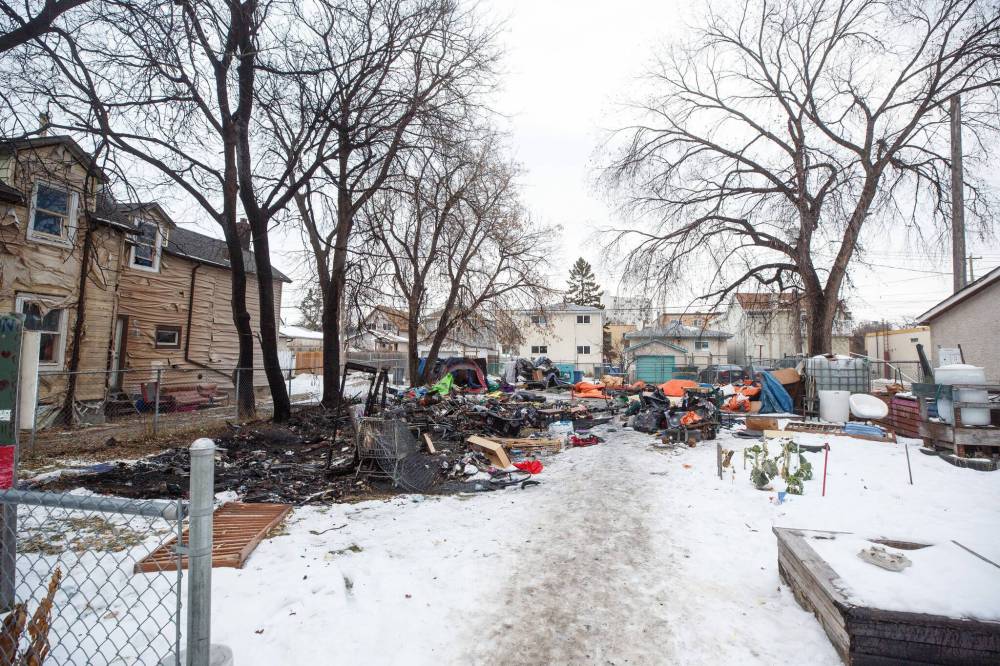
Fire situations are quick to escalate from property damage to injury and death within one of the city’s most vulnerable communities, WFPS Chief Christian Schmidt said.
“Previously, last winter, we have had deaths in the encampments, and we’ve also had… documented injuries where people have sustained significant burn injuries at these encampments as a result of fires.”
In the past month, WFPS has responded to 20 fires in encampments, with about six of those being defined as “significant,” meaning they put people staying at the encampment, greater public or responders at risk, the service said.
— with files from Joyanne Pursaga
malak.abas@freepress.mb

Our newsroom depends on a growing audience of readers to power our journalism. If you are not a paid reader, please consider becoming a subscriber.
Our newsroom depends on its audience of readers to power our journalism. Thank you for your support.







